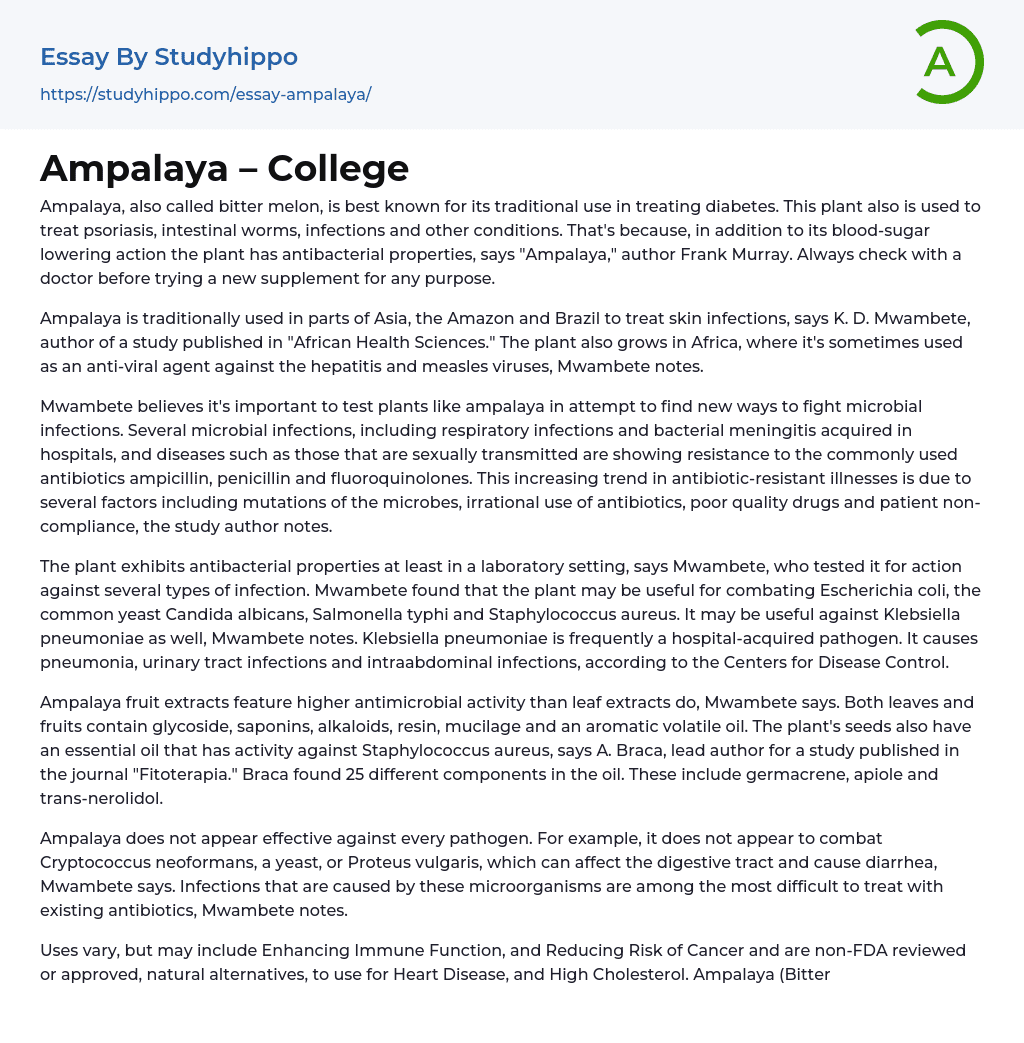Ampalaya, which is commonly referred to as bitter melon, has a long history of being used in the treatment of diabetes. Along with its traditional use for addressing psoriasis, intestinal worms, infections, and other ailments, it is also recognized for its antibacterial properties mentioned by Frank Murray in his book "Ampalaya." Before trying any new supplement, it is recommended to consult a physician.
The plant Ampalaya is commonly used in Asia, the Amazon, and Brazil for treating skin infections, according to a study published in "African Health Sciences" by K. D. Mwambete. Additionally, Mwambete notes that this plant can also be found in Africa and is occasionally utilized as an anti-viral treatment for hepatitis and measles viruses.
Mwambete highlights the importance of testing plants like ampalaya to find new ways to fight against microbial infections. Different types of infections, such as respiratory and hospital-acquired bacterial meningit
...is, as well as sexually transmitted diseases, are becoming increasingly resistant to commonly prescribed antibiotics like ampicillin, penicillin, and fluoroquinolones. The author of the study notes that this increase in antibiotic-resistant illnesses is caused by factors such as microbial mutations, improper antibiotic use, low-quality medications, and patient non-compliance.
Mwambete conducted laboratory tests to evaluate the plant's antibacterial effectiveness against different infections. The findings demonstrated its potential in fighting Escherichia coli, Candida albicans, Salmonella typhi, and Staphylococcus aureus. Furthermore, it could be beneficial against Klebsiella pneumoniae, a hospital-acquired pathogen recognized for causing pneumonia, urinary tract infections, and intraabdominal infections according to the Centers for Disease Control.
According to Mwambete, ampalaya fruit extracts have a greater antimicrobial activity compared to leaf extracts. Both leaves and fruits
contain glycoside, saponins, alkaloids, resin, mucilage, and an aromatic volatile oil. A study published in the journal "Fitoterapia" by A. Braca found that the plant's seeds also contain an essential oil that is active against Staphylococcus aureus. Braca identified 25 different components in the oil, including germacrene, apiole, and trans-nerolidol.
Ampalaya has limited efficacy against specific pathogens like Cryptococcus neoformans and Proteus vulgaris. Mwambete states that Cryptococcus neoformans is a yeast, while Proteus vulgaris can lead to diarrhea and impact the digestive tract. It is crucial to highlight that treating infections caused by these microorganisms using current antibiotics poses significant challenges.
Natural alternatives, such as Ampalaya (Bitter Melon) or Momordica charantia, have various uses including enhancing immune function and reducing the risk of cancer. These alternatives are not reviewed or approved by the FDA and can be used for heart disease and high cholesterol. Ampalaya, a folkloric cure for generations, has now been proven to be an effective herbal medicine for many ailments. Ampalaya leaves and fruits are abundant in Vitamin B, iron, calcium, and phosphorus and are also a great source of beta carotene. The consumption of ampalaya leaves offers multiple health benefits.
* Powered leaves are employed as an astringent to address haemorrhoids and piles.
* The sap or juice of leaves is utilized for the treatment of diverse skin ailments, such as eczema, acne, psoriasis, leprosy, and scabies.
* Crushed leaves provide relief for burns and scalds.
* An infusion of leaves is effective in alleviating fevers.
* Additionally, the infusion aids with various stomach issues and enhances appetite.
* A poultice
made from leaves can relieve headaches.
* Leaves steeped in water serve as a mouthwash for toothaches and other oral problems.
- Professor essays
- Should College be Free essays
- Should college athletes be paid essays
- College Education essays
- College Tuition essays
- Graduation essays
- College Goals essays
- Personal Statement essays
- Online Classes Vs Traditional Classes essays
- Online Education essays
- Student Loan essays
- Study Abroad Scholarship essays
- Reasons To Go To College essays
- Paying College Athletes essays
- Technology In The Classroom essays
- Social Care essays
- Epidemiology essays
- Drug Addiction essays
- Hiv essays
- Hygiene essays
- Obesity essays
- Teenage Pregnancy essays
- Birth Control essays
- Eating Disorders essays
- Causes Of Obesity essays
- Children Obesity essays
- Classroom essays
- College essays
- E-Learning essays
- Elementary School essays
- Examination essays
- Graduate School essays
- High School essays
- History Of Education essays
- Homeschooling essays
- Kindergarten essays
- Middle School essays
- Public School essays
- School essays
- Single Sex Schools essays
- Special Education essays
- Student essays
- Teacher essays
- University essays
- Vocational Education essays
- Apoptosis essays
- Asthma essays
- Black Death essays
- Breast Cancer essays
- Cholesterol essays




